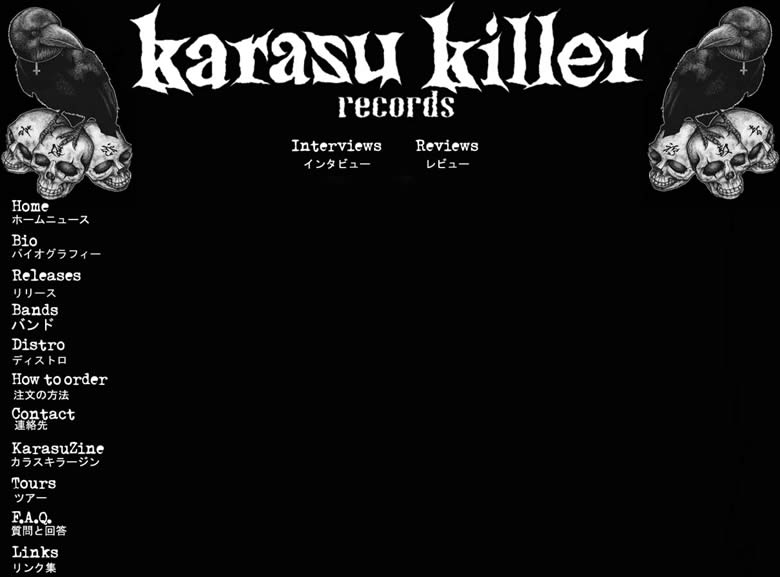
Interview: Gepeto (Ação Direta)
by Rafael Karasu (rafael@karasukiller.com)
originally published in DOLL (Japan) #240
07.29.07
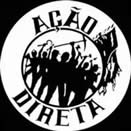
Tell us a bit about the first days of Ação Direta. How did everything happen up to the release of the first album?
The band started in October 1987. Back then, our goal was playing punk rock and hardcore. We spent some time dedicated to rehearsing and auditioning musicians till we began as a foursome. That's how we made our first show, in February 1988 in São Paulo. After that show, there were some changes in our line-up and we became a power trio. I got the guitar and vocals, Deni got bass and vocals, and Panda got the drums. That line-up lasted a long time and allowed us to work on our songs and play lots of shows and festivals in many cities. In 1989 we went into a studio to record our first demo-tape, called “Temos que Agir” [“We have to act”]. That marks our first time in a studio. In 1990 Deni left the band and we recruited Marcus “Pancho” for the bass and also Marcelo for the guitar, and I would only sing. With this new line-up we went in studio and recorded 16 songs that were released on our first LP, “Resistirei” [“I shall resist”] in 1991. With this release, the band had the opportunity of going on an extensive tour throughout the São Paulo state, besides legendary shows in other states such as Rio de Janeiro and Paraná. The album got amazing reviews in fanzines and magazines in Brazil and overseas, and it's exactly the material that you're getting now from Karasu Killer.
What are your biggest influences?
Today the band is celebrating 20 years non-stop and during this time we've been influenced by many things, but I believe we have always played something in between hardcore and metal with punk and crust influences. That's how it is till today.
How was the punk/hardcore scene in Brazil during the 80s? Which was Ação Direta's part in all that?
The 80s were very rich for the Brazilian scene, but there was a big problem which was the conflict between the many existing gangs. For many years we suffered this violence that affected all regions of São Paulo and made them dangerous and unbearable pushing the public away, closing many venues and generating a strong feeling of discrimination by the media and the society to the punks, headbangers and hardcore fans. Musically we watched the birth of excellent bands like ULSTER, RATOS DE PORÃO, CÓLERA, OLHO SECO, HINO MORTAL, LOBOTOMIA, ARMAGEDOM, PSYCHIC POSSESSOR and also the thrash metal explosion with bands like SEPULTURA, DORSAL ATLÂNTICA, KORZUS, NECROMANCIA and many others whose names were engraved in history.
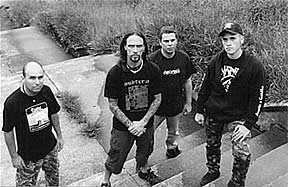 How do you see the current Brazilian scene? Which current bands do you listen to?
How do you see the current Brazilian scene? Which current bands do you listen to?
Many things have changed in the Brazilian scene since the 80s. Gradually the gangs started dissolving and a new generation was born, more concerned with activism and independent production, which was very positive and ended up putting together people and bands from many places. A new breed of media was also born, boosted by the internet and by the birth of many independent labels which incorporated the DIY mentality. A lot of bands started to emerge in the scene, specially in the 90s, like GARAGE FUZZ, AGROTÓXICO, SOCIALCHAOS, SAFARI HAMBURGUERS, ROT, KRISIUN, TORTURE SQUAD, SOCIEDADE ARMADA, PAURA and many others. Today we have a more united and organized scene, and also some venues which were fundamental for the strengthening of this scene, like Hangar 110 in São Paulo, and some websites and fanzines with strong distribution, beside many independent labels that had a partnership with bands creating a distribution process which was 100% alternative.
And the current state of Brazilian underground, what's good and what's bad? Is there support?
We've always had a large amount of bands working and creating high-quality material. Still, our country lives in an eternal financial crisis which makes all kind of planning for the bands harder, they lack money for good gear and promoting shows, because our country is geographically enormous. There's no media support, like the TV for example, where there's only room for commercially viable music and popular music whose lyrical and musical content is musically poor and tasteless, like pagode, axé, lambada, sertanejo and other consumption-made styles. Today we can count only the independent network, that works for rock'n'roll and that limits us and makes things difficult, but I can see we've achieved a lot in the past years, if compared to the end of the military regime in the early 80s!
Nowadays, which are the biggest challenges faced if you want to have a band in Brazil?
The main obstacles are getting good gear, because the equipment is very expensive. Now, with the technological advances it's easier to record CDs and promote them online, but we still have a serious distribution problem in our country. Piracy is also a very serious problem which we face and that happens because people don't have money to spend on culture and entertainment and end up buying cheaper media or downloading albums online (illegally). Making tours is also hard because it's expensive to travel across the country and there aren't many places to play. But like I said previously, we've achieved a lot recently!!
Do all members of Ação Direta have jobs outside the band?
Yes, we all have personal activities outside the band. Even though we're active since 1987 we've never achieved commercial success here in Brazil. We have prestige, respect and artistic recognition, but we all have jobs. Marcão (drums) owns a bar, Gil (guitar) works in telecommunication, Galo (bass) is a salesperson and I'm currently out of work, doing only stuff for my label/distro Bombardeio.
Ação Direta is very recognized in Europe, tell us about the first experience and how many times the band has toured there.
Our connections with people in Europe date back from the 80s. We've always sent our records to fanzines, labels and alternative radios and we've always kept in touch with the European scene. So far, we've toured Europe four times. The first in 1997 when we played 17 shows in countries like Portugal, Spain, Belgium, The Netherlands, Switzerland and Italy. Then in 1999 when we played 27 shows, this time going also to Slovenia (where we recorded a live album), Germany, Croatia (right when the Kosovo War was going on) and France. In 2001 we played 33 shows in 37 days throughout Eastern Europe and in 2004 we did our longest tour, spending 45 days in European ground. On this tour we were denied entry in England and went through difficult times suffering discrimination and being deported.
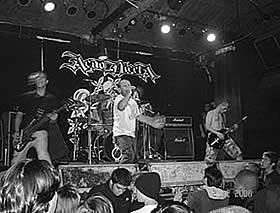 What is the receptivity of the European audience towards a Brazilian band like?
What is the receptivity of the European audience towards a Brazilian band like?
Europeans are very educated and usually open to new cultures. We were very warmly received in virtually every country where we've been to and played in, and they have great respect for the Brazilian and South American scenes. Now we have three of our albums released there and a lot of contacts and friends.
“Resistirei” is a classic album, the band's first work, which will be released in Japan through Karasu Killer. What are the expectations for this release?
We're very happy and there are strong expectations, because we have a lot of admiration and curiosity towards Oriental culture and the Japanese scene. We know you guys like a lot of punk/hardcore/metal and all their different sub-genders and we'll work hard so that this is only our first of many releases there. We're starting this partnership with Karasu Killer now, and the idea is extending it to the band's complete discography. We want Japanese people to have full access to everything that's been released by Ação Direta in these 20 years, showing all our work, the natural evolution of it and also the services provided to the scene and to the cause. We hope everyone really enjoys this first release in Japan, and expect many more ahead!
Ação Direta's lyrics talk about Brazilian social problems, the greed for power, corruption, poverty and hunger. You wrote about that twenty years ago. In your opinion, did anything change? What's the real Brazilian situation nowadays?
Unfortunately the majority of our lyrics is still up-to-date. Our country faces many social problems and we have an awful income distribution, which is almost absurd. We have problems in crucial sectors like education, job availability and health, and we're living difficult times where there's a drastic increase in urban violence and criminality. Unfortunately everyday we have news about power corruption, misappropriation of public funds, money laundering from guns and drugs trafficking, and constant social injustice and impunity. Another serious problem are environmental issues, we're suffering all kinds of aggression, to our forests, rivers and animals, and we can feel the effects of global warming on our daily life. The authorities in the country show no competence to solve these issues and we've seen situations of complete abandonment, mafia and impunity.
More and more we talk about corruption, violence and unemployment in Brazil, what do you see for the country's future?
We're a rich country in territory, fauna, flora, minerals, fertile land and creativity, and still we have suffered since the empire up to nowadays. There's a serious cultural problem here, and a delayed and disrespected constitution, which favors illicit practices and corruption. It's impossible to see significant improvement soon, that's sad to admit, but it's our reality. This feeling of disbelief towards the authorities is already seen on the attitudes of society because of the noncompliance to the country's laws and constant cases in which criminals of all kinds go unpunished, generating more disbelief and insurgence! Right now we're a minority and the good people in society are questioning themselves, thinking “are we losing this war?”.
How would you like Brazil to be?
Above all, a fairer country! More peaceful, and with more opportunities. A country with a fairer income distribution, fair access to education, culture, health and jobs for everybody. A corruption-free country, where politicians worked for the nation, for society. Without sexually exploited and drug trafficking exploited children, or abandoned without shelter and infrastructure. No slums, no poverty. With serious housing projects and advanced, familiar and sexual education. A country for all!
The reality here is completely different from the Brazilian, what do you know about Japan? What do you admire about this nation?
Here in Brazil, we get a lot of news from your country, and we also have many Japanese born and Japanese descendents living here. I really admire the whole Oriental tradition, commitment to work, your relation with the environment, the technological advances and specially the discipline, meditation and the knowledge about existentialism and the value of every single human being.
Japan fascinates Brazilians, everybody wants to play here, tell me, what's the possibility of Ação Direta coming here for a tour?
We're starting a new phase for the band with the partnership with Karasu Killer, which is providing us direct contact with the Japanese public. Like I said previously, it's a new phase, we really want to tour Japan, but we want to do it at the right time. The first step is being taken, that's making our records available for the Japanese audience. We hope people like it, and that it makes the band and also the audience really motivated, so that this ancient dream comes true. I can say that we'll do everything we can for that to happen in the near future.
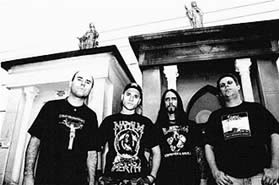 This year, Mukeka Di Rato came to Japan to tour many cities, the feedback was excellent, since many Japanese people admire Brazilian hardcore. Today we can say that there's a good relationship between these two countries, would you like this to become an exchange, with Japanese bands playing in Brazil and Brazilian bands playing here?
This year, Mukeka Di Rato came to Japan to tour many cities, the feedback was excellent, since many Japanese people admire Brazilian hardcore. Today we can say that there's a good relationship between these two countries, would you like this to become an exchange, with Japanese bands playing in Brazil and Brazilian bands playing here?
Mukeka's tour is still fresh but we can already measure the positive effects it had. I believe the first step was taken to strengthen this exchange between both countries. I can also say that Brazilians have a lot of curiosity about the Japanese scene, and it would be nice to see Japanese bands touring here. We've had Vivisick and Guitar Wolf. I believe that with this exchange between labels and bands from both countries, it will be possible to have better promotion for both independent scenes and this will make things easier in the near future.
Which Japanese bands do you know? What impresses you the most on Japanese bands?
I know old bands like Lipcream and S.O.B., which I really like. I've also seen Vivisick live, they've impressed me a lot. I have the complete Disclose discography, released in Brazil in two volumes. I like these bands' chaotic sound, playing grindcore differently, mixing it with Oriental culture elements.
Which message would you like to send to Japanese readers?
For us, it's a great honor and a great opportunity being able to have our records released in Japan. We admire your country a lot, its traditions and organization. We hope that soon, we're able to go and play as many cities as possible, sharing the stage with bands that make this scene grow. We would also like to send our love to the whole Brazilian community in Japan, and we'll be counting on them for support too, so that we can all be together soon! We're also sincerely grateful to our friend Rafa from Karasu Killer for his amazing support and patience!! Health and peace for everyone!!
Contacts:
www.acaodiretabrasil.com.br
adgepeto@uol.com.br
bombardeiodistro@bol.com.br